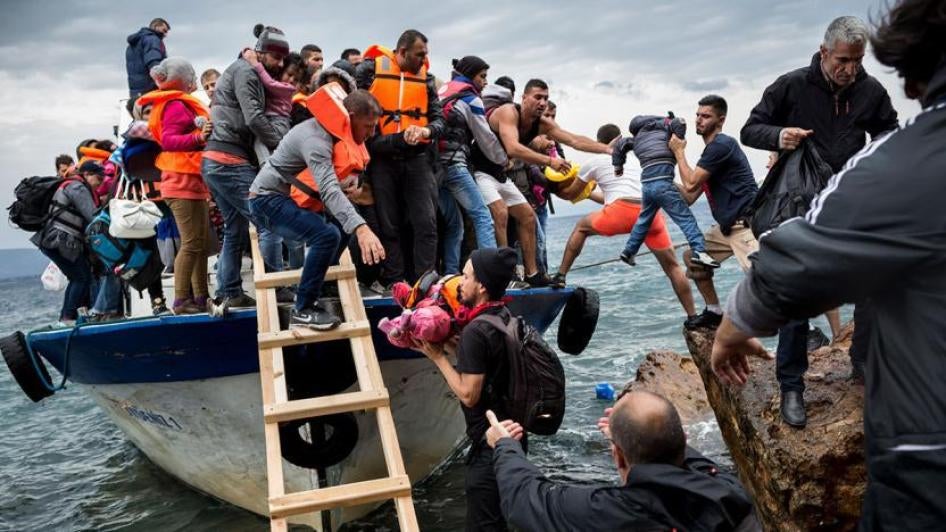The road to impact can be long and complex. This article illustrates how Human Rights Watch documents the war in Syria and the ensuing refugee crisis and is now using this information to advocate for the protection of refugees and migrants. We hope this work will result in future impact.
Some 60 million people worldwide have been forcibly displaced from their homes—the highest number since World War II. Most of them fled war and persecution in Afghanistan, Eritrea, Iraq, Somalia, and, foremost, Syria. In 2015, more than 1 million people reached the European Union via the Mediterranean and Aegean Seas. More than 3,700 people died or went missing trying.
Many of those who arrived on European shores face unfair asylum procedures, closed borders, discrimination, and inhumane treatment. In the wake of the terrorist attacks in Paris and elsewhere, some countries are further tightening borders, leaving desperate people with nowhere to go. Human Rights Watch is documenting the crisis every step of the way—from violence and persecution in countries of origin, to abuses faced along the perilous journey to safety, to the reception in destination countries. And we have been advocating that governments respect the right to seek asylum; provide decent reception conditions; conduct fair refugee status determination procedures; maintain adequate standards of living, access to education, work rights, healthcare, and timely access to durable solutions for recognized refugees; and, most fundamentally, respect for the principle of nonrefoulement, the international law prohibition on forcible return of refugees or asylum seekers to face persecution, torture, or other serious harm.
Our work begins with the atrocities driving flight and fueling the refugee crisis. Our researchers have been operating for years in refugee-producing countries, building pressure to curtail the war crimes and repression that compel people to flee. In Syria, for example, we have been at the forefront of documenting the government’s use of barrel-bombs and other indiscriminate attacks on civilians that are the largest source of civilian deaths. At the same time, we have addressed atrocities committed by Islamic State (also known as ISIS) and other extremist armed groups. Mobilizing international pressure to end attacks on civilians has been our first priority—and we have seen incremental progress, such as the opening of a besieged area, the release of prisoners, or a lull in the barrel bombing.
About 4.8 million Syrians have fled their country. The vast majority of refugees remain in the immediate neighboring states of Jordan, Lebanon, and Turkey. The insecurity of life even in these first-arrival countries, combined with the failure of the international donor community to provide adequate humanitarian support, has led to the movement to Europe.
We are pressing the European Union and its member states to establish a resettlement program that would provide safe and orderly access to durable solutions in Europe for refugees in countries of first arrival, but not at the expense of blocking other refugees from exercising their right to seek protection, as the current EU-Turkey Action Plan does. We continue to press the EU for a more equitable permanent system of responsibility sharing for asylum seekers who reach points of entry, like Greece and Italy, so other EU member states that have the capacity to process claims fairly and effectively will provide their fair share in managing this challenge. Our role is to keep policy makers focused on the real human lives at stake and the feasible steps that can be taken to mitigate their suffering while still responding to Europeans’ legitimate security concerns.








